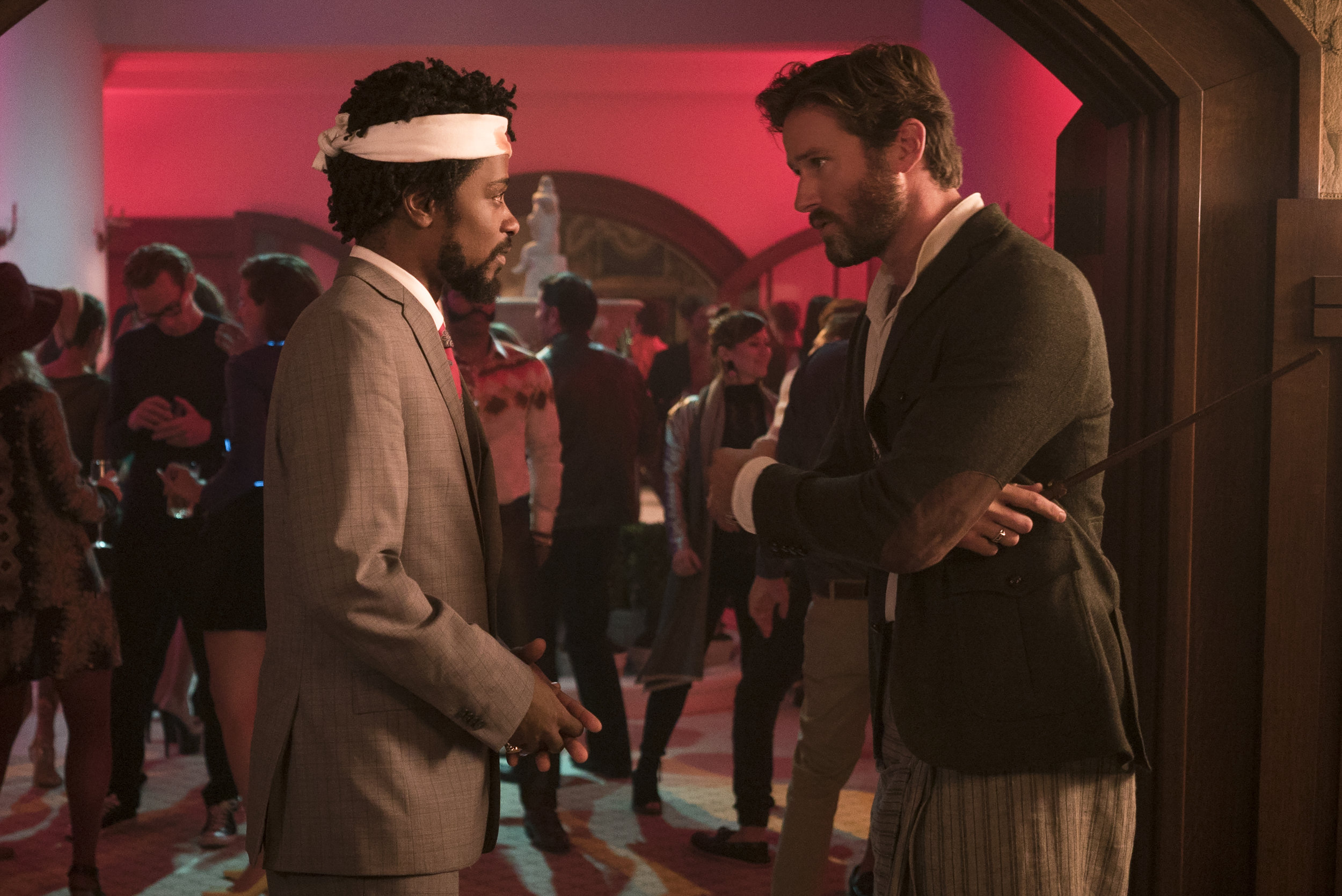'Sorry to Bother You': Skewering America, one absurdity at a time
Lakeith Stanfield in "Sorry to Bother You." (Photo courtesy Peter Prato/Annapurna Pictures)
“Stick to the script.” This is the marching order for Cassius Green’s new job as a sales telemarketer. It’s repeated many times over to the protagonist of “Sorry to Bother You.” “Stick to the script.” A sign hangs in the dingy fluorescent-soaked office: “S.T.T.S.” Stick to the script. Stick to the script. Stick to the script.
The irony soon becomes obvious - as the film unspools, one realizes writer-director Boots Riley is doing anything but. If there’s a fork in the road of the plot, he finds a third route. If you feel a straight 4/4 beat in the narrative pulse, he’ll soon segue to outre jazz. If there’s a conventional element to the film, he drapes it in psychedelia. Stick to the Hollywood script? Hardly.
Which isn’t to say Riley’s influences don’t occasionally emerge. “Sorry to Bother You” acknowledges a broad swath of provocative cinema ranging from “Idiocracy” to “Brazil,” with unexpected winks at “Eyes Wide Shut” and bizarre nods to ’80s midnight-kitsch movies. It wriggles free from easy description, and can be a rocky hodgepodge of a watch, but is nonetheless restlessly original. Also strange, angry, hungry, silly, irresistible and utterly unhinged, yet entirely clear in its goal: to satirize our world, its people and its myriad ills, by reflecting its humanity and monstrosities.
As Cassius, or Cash, Lakeith Stanfield - he of “Atlanta,” and brief, but thematically vital scenes in “Get Out” - grounds a film very much in need of someone to keep it from going stratospheric. In the opening scene, Cash gets his job selling encyclopedias by faking his credentials; his future manager sees through the elaborate ruse, but admires his gumption. “We’re not mapping the f---ing human genome here,” he says to Cash.
Tessa Thompson in "Sorry to Bother You." (Photo courtesy Peter Prato/Annapurna Pictures)
Cash struggles at first; he repeats the title of the movie while making cold calls, which end with abrupt hang-ups. A fellow African-American worker drone in the neighboring cubicle, Langston (Danny Glover), gives him some advice: Use your “white voice.” Cash bears down a little, and out comes a nasal tone provided by comedian David Cross, in a heard-but-never-seen performance best described as squeezed, flattened geniality. (Langston’s Caucasian accent sounds a lot like Steve Buscemi, although he’s not credited.)
Armed with his new audio weapon, Cash fast-tracks his way up the company ranks, attaining coveted “power caller” status. His lifestyle jumps from a smoke-billowing jalopy - in an early scene, he pulls up to a gas station and asks for “40” on the pump, and the camera tilts to reveal a quarter, a dime and a nickel in the cashier’s tray - to a smooth-gliding Tesla. Success puts Cash at odds with his co-workers, led to strike by Squeeze (Steven Yeun) over poor treatment. Cash breaks the line to get to work every day, straining relationships with his best friend, Salvador (Jermaine Fowler), and girlfriend, Detroit (Tessa Thompson, of “Thor: Ragnarok” fame), an artist of great earnestness who earns a living twirling a sign that reads “SIGNS” on a street corner for a sign shop.
Such is the core story mechanism of a film set in a late-capitalist society that appears ready to devouring itself. The America Cash lives in is as terrifying as it is funny. Millions watch the self-explanatory TV show “I got the S--- Kicked Out of Me.” A company called WorryFree offers volunteer residents free food and lodging in prison-type conditions in exchange for the promise of permanent work; WorryFree is led by an uber-rich cocaine-hoovering Zuckerberg-type, Steve Lift (Armie Hammer), who deflects accusations of exploitation and slavery.
Lakeith Stanfield and Armie Hammer in "Sorry to Bother You." (Photo courtesy Peter Prato/Annapurna Pictures)
While crossing the strike line, Cash is hit with a full can of soda, a video for which becomes viral, rendering the protester a celebrity, and him an object of widespread ridicule; for the rest of the movie, he sports a bandaged head wound, prompting us to question the clarity of his, and perhaps our, perception of subsequent events.
Of course, those further developments only further illustrate the bizarre nature of this reality, which is nothing if it isn’t a blatant exaggeration of our own. Riley fearlessly stirs a variety of contemporary discussions on racism, sexism, art, commerce and economic disparity into a colorful, ambitious satire existing less as commentary and more as provocation - especially during scenes of urban rioting surely meant to evoke the troubling violence in Ferguson and Charlottesville. Of course, the same idea applies to the film’s wildly entertaining elements of mad science and twisty conspiracy, which prevent the enterprise from sinking under the weight of despair.
If modern life in Donald Trump’s America is a bombardment of headlines that successively seem further and further beyond the pale, “Sorry to Bother You” is a clear reflection of our current nigh-hyper-reality. The film is relentless and chaotic, a deeply discomforting surrealist comedy needling us out of our seats, because we can’t just sit by and watch with mouths agape as society jumps the rails, can we?
‘Sorry to Bother You’
★★★½
MPAA rating: R for pervasive language, some strong sexual content, graphic nudity, and drug use
Cast: Lakeith Stanfield, Tessa Thompson, Jermaine Fowler, Omari Hardwick
Director: Boots Riley
Run time: 115 minutes





